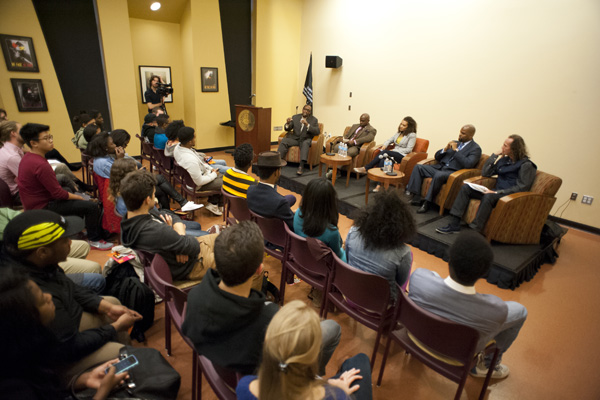Music, race, and the White House

Hip-hop in American culture and its connection to Barack Obama’s presidency set the stage for a stimulating panel discussion on Wednesday night with experts in race, music, gender studies, pop culture, and politics.
Titled “Hip-hop in the Age of Obama,” the event drew more than 100 attendees to the Amilcar Cabral Center. The event was presented by the Northeastern Center for the Arts, Northeastern Black Student Association, and the John D. O’Bryant African-American Institute. It was held in conjunction with the center’s weeklong residency with the cast of Word Becomes Flesh, which will be performed Saturday night at Northeastern.
The panel included Mark Anthony Neal, an author and professor of black popular culture at Duke University; renowned performer, artist, and educator Marc Bamuthi Joseph, who wrote and directed Word Becomes Flesh; and a trio of Northeastern faculty—assistant professor of communication studies Sarah Jackson, associate professor of music Emmett G. Price III, and associate professor of media and screen studies Murray Forman.
Neal opened by discussing black masculinity, which he said is more visible today than it’s ever been in American culture.
“You can’t turn on the TV or your computer without coming face to face with images of larger-than-life black men,” he said, noting people such as President Obama and NBA superstar LeBron James. However, he said many Americans are still afraid of black men on an interpersonal level, pointing to Trayvon Martin, the Florida teenager fatally shot in 2012 by neighborhood watch captain George Zimmerman.
“These are the kinds of things that happen for black men up close and personal, and there’s an odd disconnect between that dynamic and the fact that everyone loves Jay Z, LeBron James, and Will Smith. But that doesn’t translate into our everyday relations with black men,” he said.
Joseph said that Martin’s shooting death also brought the issue of accountability into focus. “After the verdict, the most powerful and poignant symbol of accountability was the President of the United States,” he said, noting how Obama commented that if he had a son, he might look like Martin.
“Hip-hop being the music I grew up with, there’s no better instrument, I think, than the music,” Joseph continued. “Unfortunately, we often fail to use the music in that way. Using his bully pulpit, I think President Obama dramatically brought us to a place of compassion.”
Throughout the evening, the panelists debated topics ranging from hip-hop’s use for social good to whether Obama’s inspiring oratory aligns with the policy of his administration.

Dahlak Brathwaite, a cast member of “Word Becomes Flesh,” which will be performed Saturday night at Northeastern, gives a preview of that performance prior to the panel discussion.
The discussion also often circled back to the issue of accountability. Price, an ordained minister and a leading expert on African-American music and culture, noted that hip-hop has historically taken other U.S. presidents to task over various issues, but this hasn’t been as prevalent in the mainstream media during Obama’s presidency.
Joseph acknowledged he was conflicted over whether hip-hop should play a role in holding Obama’s accountable for his policies—such as the use of drone strikes overseas, a topic that came up several times throughout the evening—or whether those conversations should instead occur at church or the dinner table.
Jackson, whose research and teaching interests revolve around how social and political identities are constructed in the public sphere, countered that critiques can be nuanced—that is, a person or the hip-hop community can support Obama and still be critical of him.
For his part, Murray, who studies media and culture with a primary focus on popular music, race, and age, noted that during trips to Europe, he’s encountered graffiti that is both supportive and critical of Obama. He also compared Obama with former President Bill Clinton, whom the African-American community largely supported. “That’s white hip,” Murray said, “and Clinton can be that, but he’s never going to have what Obama has,” which he said has been described as a “soulful style.”





